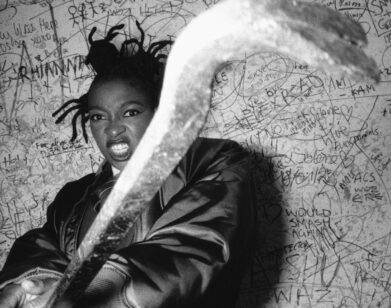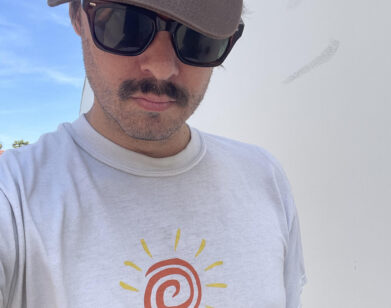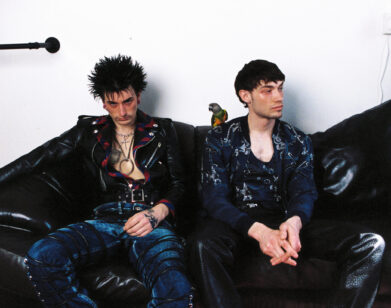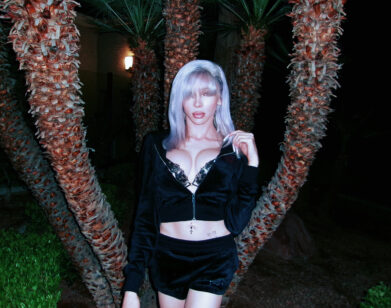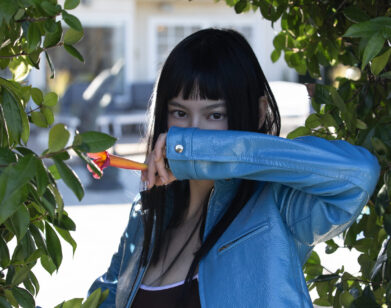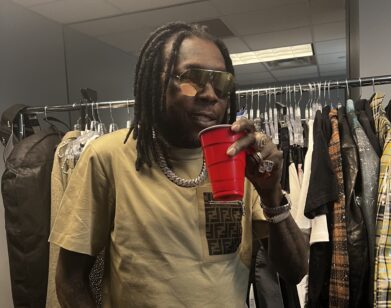Ever Faithfull, Ever True
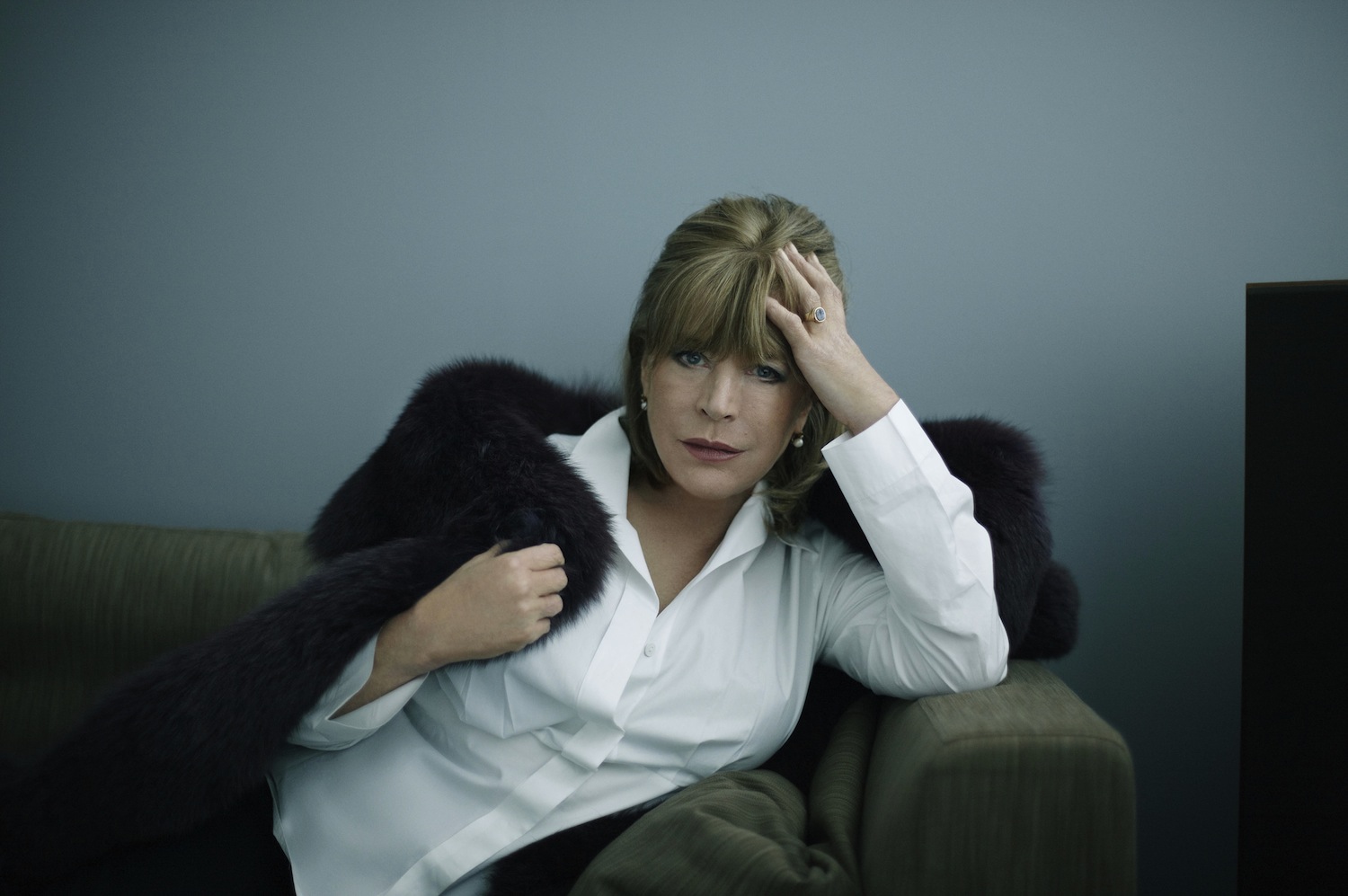
MARIANNE FAITHFULL. PHOTO COURTESY OF PATRICK SWIRC
What can you say about Marianne Faithfull? Folk goddess. Rolling Stones’ muse. Legendary addict. Scandalizing memoirist. Cancer survivor. Critically-acclaimed actress. The 64-year-old Paris-based Londoner is the epitome of the hard-charging/hard-living artist. “But I’m a musician first,” implores Faithfull outside of New York’s Standard hotel last week while discussing her 23rd album, Horses and High Heels. Recorded at New Orleans Piety Street Studios, the album is a wistful brew of Marlboro-throated tough love. Comprising soul and folk covers and four original tracks (two with backing from Lou Reed), it’s a dark, deep, sometimes danceable meditation on the slippery slope of time.
“It became really clear to me what I’m really interested in,” she says. “Time, fame, truth, beauty, death, going to or away from the loved one. All those feelings.” Faithfull talked about the new tunes, upcoming films, and the acting role she’s destined for: think Ab Fab-meets-Mr. Roper.
MICHAEL SLENSKE: Where did this album get off the ground?
MARIANNE FAITHFULL: It started a long time ago. You know, the story in “Why Did We Have To Part?” did happen, and the lover I’d been with for years fell in love with another woman.
SLENSKE: When was that?
FAITHFULL: Four years ago now. I was so upset I couldn’t write anything. I never can in the middle of a scene like that; I just don’t want to. But when it’s over, with retrospect, I can do it.
SLENSKE: So at what point did you say “I can revisit this”?
FAITHFULL: Well, what I did was I made Easy Come, Easy Go in between, which was all covers—to cover myself really. I only wrote the songs [for Horses and High Heels] last year.
SLENSKE: But you were toying with this album before Easy Come, Easy Go?
FAITHFULL: I was planning it, yeah. I think what I had was a very vague idea of making a simple pop record and not being elaborate or using metaphors or anything like that, just doing it.
SLENSKE: On this album there seems to be much more wistfulness with the covers, but your tunes . . .
FAITHFULL: They’re tough.
SLENSKE: They’re tough, but they’re also more forward-looking. It seems like you’re caught in this middle place, where you don’t know which way to go.
FAITHFULL: Well, I always am, man. I’m never, never sure. I’m full of unsureness. That’s been a habit for years. I never really want to commit.
SLENSKE: So why didn’t you write more songs? Every critic wanted more.
FAITHFULL: They love my songs. Fans want me to write more, so next time when I make a record, and I probably will, I’m stockpiling. I’m making songs like three years before we have to go . . . I hope. Cross my fingers.
SLENSKE: What’s so difficult about it? Is there some process you try to follow?
FAITHFULL: Not really, I have two ideas—one I’m writing with Doug Pettibone; the other I’m writing with Wayne Kramer.
SLENSKE: Could you ever see yourself doing a residency somewhere?
FAITHFULL: Yeah, if it was like a stage play and you could go every night.
SLENSKE: Maybe something like Rufus Wainwright did at Carnegie Hall with the Judy Garland thing?
FAITHFULL: I would love to, but maybe you have to have some sort of project like the Judy thing. I have a very good agent who is booking me three nights at the City Winery. That’s moving in the right direction. I’d like to do a week.
SLENSKE: It’s seems like the last two albums have been building toward that lounge sort of vibe.
FAITHFULL: I know, and I could.
SLENSKE: Is there one place you’d want to be?
FAITHFULL: I’d love to make more money in America, that’s the heart of it. I make much more money in Europe. It’s a shame. I’m trying now to make a profit on this next tour, and I’ll be much happier.
SLENSKE: How do you select the covers? Is there a process or a theme?
FAITHFULL: Well, I’ve got certain themes I’m very interested in. One of them is time. So there’s a lot of playing with time on this one.
SLENSKE: Yeah, you’ve got Carole King’s “Goin’ Back,” “Past, Present, and Future,” your song “Eternity.”
FAITHFULL: Yep. I think I’ve always been interested in these things, but I’ve been working on a lovely little show—I haven’t brought it [to the US] yet, and I’ll be putting it out at Christmas on the Internet as a download. I’m reading 22 of Shakespeare’s sonnets. I’ve been doing it for quite a few years, and in doing the sonnets, my actual real focus became very clear. I do it with music, with this great, world-class cellist called Vincent Segal. I do a sonnet and then he does a specially composed piece of music. It’s not like Rufus’ songs where I’m singing it; I’m speaking it.
SLENSKE: It’s really interesting the way you collaborate with people.
FAITHFULL: I’m very lucky, yes. I’ll go to enormous lengths to cooperate.
SLENSKE: Do you think that’s the key?
FAITHFULL: I do. I put them very high up in my estimation.
SLENSKE: It seems like you did that with Antony Hegarty [on “Ooh, Baby, Baby”].
FAITHFULL: Oh, yeah. Antony is really leading it, I’m just following. He’s got this beautiful voice and I don’t have a beautiful voice. I have quite an interesting voice, but with a voice like that . . .
SLENSKE: Do you approach all collaborations like that?
FAITHFULL: No, some of it is a lot more equal. When I did Kissin’ Time, I had to do a lot to make that happen, and I did it. I had to go to Salt Lake City with Billy Corgan and go all over the place, which is an awful drag for me, but, to be fair, it was equal because Billy came to Ireland where I was living at the time. We really got to know each other, and then we wrote these wonderful things together. He’s so talented. I know he seems to have hit a brick wall at the moment, but I’m hoping when I see him in Chicago I can find out what’s going on.
SLENSKE: Is there someone you haven’t worked with yet that you want to?
FAITHFULL: I’ve worked with everybody I’ve really wanted to.
SLENSKE: None of the up-and-coming artists?
FAITHFULL: I don’t really find them that interesting. We’ll have to wait and see. You know when I made Kissin’ Time and Before the Poison, it was a particularly good crop: Beck, Jarvis, Damon Albarn. All these people were particularly brilliant.
SLENSKE: Do you want to do another collaborative album?
FAITHFULL: No. I would, but on the next album I want to write with Nick Cave.
SLENSKE: Have you two discussed that yet?
FAITHFULL: No, but he knows I’ll hit on him one day. But he’ll do it. We really like each other.
SLENSKE: How are you approaching the live shows? Are they going to be like the ones for Easy Come, Easy Go?
FAITHFULL: No, no, no. That was real fun because we had a huge band, and it was just fabulous, but this is four-piece, and with me it’s five.
SLENSKE: Do you prefer it to be pared down like that?
FAITHFULL: I do. Then I’ll really make a profit. The Easy Come, Easy Go tour was like a gift, a bit of environmental generosity. And I came back poorer than I left home. I thought, “Oh, well,” because it is a gift and giving it to my audience and they’ll love it. And they did. Violins, horns, the whole bit, but you can’t make any money on that. I do that from time to time—just give it away for nothing. That’s the awful problem about America for me, but you know, things might get better. More people might come to the shows, people might buy this record. I always live in hope.
SLENSKE: What about your new film Belle du Seigneur?
FAITHFULL: Oh, I only play the housekeeper. It’s not a major part, but I did enjoy it. When you come in like that, like a hired gun, you don’t have any control. It might be good, and it might not be. They asked me to sing a song in one scene. Tom Stoppard’s son, Ed, plays the son and I’m packing his suitcase and they asked me to sing a song under my breath, so I just then remembered the words to “Love Me or Leave Me Alone” and it was just perfect. But they didn’t want to pay for the rights, and I got a bit worried because that seemed cheap to me. I also worked on another one film last year called Faces in the Crowd with a young French director. We did it in Winnipeg, so it was all very weird, but I quite enjoyed it. I played a psychiatrist. Milla Jovovich is the lead. I don’t know, man, I would love it to turn out really well. I was very lucky [with Irina Palm]. I did it very well, and it worked out very well, but those sort of film projects don’t come along very often.
SLENSKE: Do you ever think of writing scripts?
FAITHFULL: That would be too much work. I would probably enjoy it, but, man, I find it really hard to write a song. Really. I’m great friends with Carrie Fisher and she could do that, but it’s a special talent.
SLENSKE: It’s funny you say that, because it seems like your memoirs could adapt for the stage pretty seamlessly.
FAITHFULL: People have always wanted me to, but I don’t want to, because I don’t want to hang on to the ’60s. I want to let them go. It was too sad, the whole thing in the ’60s, but I am so identified with that. It was only four years of my life, particularly with the Rolling Stones. I’ve got no problem with the Rolling Stones, I’m grateful for what they did with me and I love all the songs we worked on together, but it’s the association I don’t want.
SLENSKE: Well, do you ever think about doing more TV? That Ab Fab sketch with Anita Pallenberg was pretty amazing.
FAITHFULL: It was. We had a lot of fun, and the whole way it happened was such fun, because I was quite stern with Jennifer [Saunders], and I was like, “I don’t want to play myself.” And that’s when she cracked right back and said, “Would God do?” What could I say?
SLENSKE: I could really see something like that as a TV character.
FAITHFULL: I’d really like people to see me as a real actress, which I am, but they don’t. It’s hard to get them to see me as a musician, they just see me as a hanger-on to the Stones, which is not what I am at all. It’s a good idea, and if something like that would turn up I could do a whole television show. I’ve thought about playing a landlady, sort of a mad ’60s lady, this absolutely insane character. I would love it. It’s a great idea. Wouldn’t it be funny?
SLENSKE: Has anyone ever approached you to do something like that?
FAITHFULL: No, I don’t even know why I’m telling you. It’s just my idea. And I don’t really like to hustle, and I don’t have to do it in my music.
SLENSKE: Has there ever been anyone who was reluctant to let you take a song?
FAITHFULL: Covers? Of course not. Well, there was one guy who didn’t want me to do his song, and I didn’t, and that was Bonnie “Prince” Billy. I just love the tune, which was called “A King at Night.” I don’t think we really could connect. He’s a real hick, and he presents himself as a hick.
SLENSKE: That’s funny. Have you ever thought of going back to an electronic sound like you did with Broken English? It seems like so many artists of your generation are doing that right now and you sort of pioneered it three decades ago.
FAITHFULL: It’s like Donna Summer with some time. I did do some electronic on Kissin’ Time, especially with Beck. It’s always been my feeling that Broken English cannot be repeated. The whole thing of coming off the street, taking hard drugs, and then stopping and making Broken English was a very weird concept, and no one else has ever done it. I would do another electronic record, but it might fail. All these things start on a guitar or a piano. The core group on Broken English was real. It was all really there, what made it a disco record was when Steve Winwood came in and put on the synthesizers. He did this wonderful stuff, but I rather liked it before Steve put it on, but the Winwood touch was magic. What I really like is real musicians, playing in real time. But it could be done. I’ll talk to the producers.
SLENSKE: Maybe I’ll push you in a new direction on your next record.
FAITHFULL: I like it when people push me. I’ve always been interested in what people wanted, but I must tell you, it won’t be a repetition of Broken English. It would be something else.
HORSES AND HIGH HEELS IS OUT NOW. FOR MORE ABOUT FAITHFULL, VISIT HER WEBSITE.

